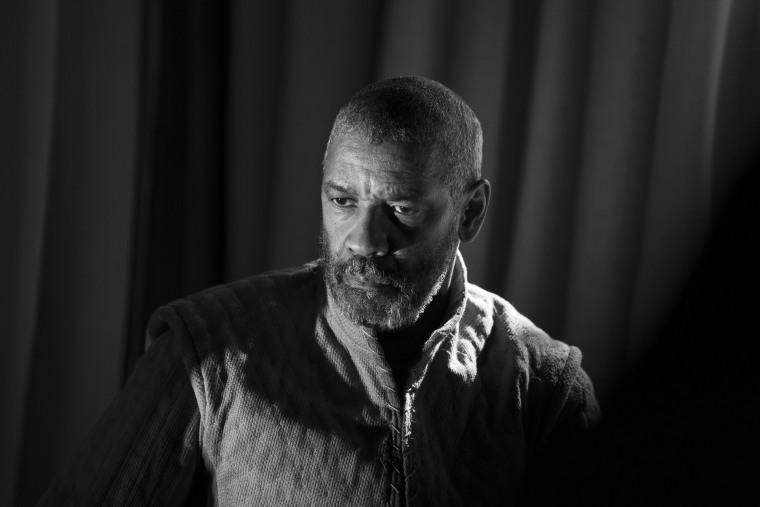Two men, weary and bloody from battle, emerge from a white mist to commune with an old woman on the edge of a mirror-clear pond. In the pond, where she should have a single, dark reflection, there are two. She (they?) have a message for one of the men, and though it sounds welcome, it is fatal: “All hail, Macbeth, thou shalt be king hereafter!”
This is how “The Tragedy of Macbeth” begins its thrilling descent into carnage and madness.
This is how “The Tragedy of Macbeth,” opening in theaters on Christmas Day (and streaming on Apple TV on Jan. 14), begins its thrilling descent into carnage and madness. The film is directed by Joel Coen, who is without his brother and co-writer-director Ethan for the first time in their nearly 40-year career together. The pair’s specialty is black comedy — ”The Big Lebowski,” “Fargo,” “Inside Llewyn Davis” — but alone, Joel has made something darker, less arch and more linear than his movies as one of the Coen Brothers.
At the film’s heart is the marvelous Denzel Washington, who plays Macbeth as a kindly old veteran preparing to rest on his laurels after a career dedicated to King Duncan (Brendan Gleeson). Or so it seems at first. He and Lady Macbeth (a perfect Frances McDormand) have been plotting Duncan’s death, and a whole history of their complicated relationship can be read between Shakespeare’s lines in their chemistry. Macbeth knows that going through with his wife’s plot could push him over the edge, and so does she, and they do it anyway. What follows is a series of bloody inevitabilities, but as the film ticks down — often literally, with a rhythmic knocking sound pervading the score — Washington makes it impossible to look away. He’s the inverse of a Clint Eastwood character: not a curmudgeon with a heart of gold, but a gentle exterior concealing a heart dried down to a murderous husk.
The movie’s final sword fight, between Macbeth and his nemesis, Macduff (Corey Hawkins), out to avenge the family Macbeth has murdered, is fought in a literal trench so narrow the men can only move forward or back. Destiny, and architecture, require a duel to the death, and the witch who predicts the battle royale (the incredible Kathryn Hunter, probably best known among theater nerds for her work with the U.K. theater company Complicité) taunts Macbeth with ambiguous suggestions of his forthcoming demise. She, and we in the audience, can see the hopeless machinery of Macbeth’s death at work — even if Macbeth himself can’t.
Macbeth, Lady Macbeth and Macduff are at the center of Coen’s distorted lens, and so they are the least caricatured. Around the periphery, Coen has placed the kind of cartoony bit players who typically make the Brothers’ movies so memorable: Harry Melling as Malcolm; Stephen Root as the Porter (providing much-needed comic relief); and Alex Hassell as the conniving Ross. Coen has beefed up Ross’s role — a messenger and narrator in the original Shakespeare, he’s now also a sort of grand vizier figure with his own ideas about who ought to sit on the throne.
Overall it’s a remarkable movie, filmed in black and white in starkly lit sets that give Washington and McDormand dramatic blocks of light to play with. The scenography evokes revolutionary 19th-century scenographer Adolphe Appia, but with thoroughly modern special effects and camerawork. We don’t see the seams or borders of the set dressing the way we might in an older film with similar influences. It produces a wonderfully disorienting effect, as though Coen had shot his “Macbeth” on location in the world of Appia’s half-remembered nightmares.
But the highest compliment I can pay “The Tragedy of Macbeth” is that I understood one of my favorite plays better after having seen it. I’ve always loved “Macbeth”; it’s one of the few works of Shakespeare that stands a fighting chance of being enjoyed by teenagers, with its bloody battles, black magic and betrayals. Only in Coen’s version, though, did I really understand the title character himself — how he arrives at his dead wife’s side, moaning, “Tomorrow and tomorrow and tomorrow creeps in this petty pace from day to day to the last syllable of recorded time, and all our yesterdays have lighted fools the way to dusty death.” It’s hard to reckon with this devastation on the page after Macbeth so blithely kills his old friend and leader.
In Coen’s version, when Macbeth kills Duncan, he wounds his own conscience fatally. Madness infects that wound, until he is screaming bizarre insults (“thou cream-faced loon!”) from the throne. It’s all the more jarring when he begins to hallucinate the witches who foretold his doom. Are they a dream? The answer, it seems, doesn’t much matter. Only action matters, for Macbeth. Action, and its awful, unavoidable consequences.

